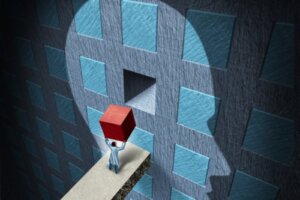Mental Sandboxes and Their Usefulness in Today's World


Written and verified by the psychologist Valeria Sabater
Stephen Hawking said that, as humans, we often establish the kind of learning that’s familiar to us and that doesn’t require excessive cognitive effort. In his opinion, our main enemy isn’t ignorance, but the illusion of knowledge. In other words, the feeling that we know everything already and that it’s better to reject anything that’s challenging.
However, we make great advances and acquire knowledge when we assume the kinds of revolutionary concepts that are often antagonistic to our particular visions. Indeed, if we only integrated into our minds what best suited our beliefs, without contradicting them, we’d remain in the same place. We can’t conquer anything by always thinking in the same way.
Genuine learning comes when we take risks and leave our mental comfort zones to analyze other ideas and perspectives. It doesn’t matter how strange or irrational they may seem to be. An interesting concept developed by the mathematician and writer, Eric Weinstein, is useful for taking this step. Let’s find out more.
One of the individuals who used the concept of mental sandboxes the most (unknowingly) was Albert Einstein.

Mental sandboxes
Eric Ross Weinstein is a renowned American mathematician, economist, and writer. He presents a podcast in which he exposes fascinating revolutionary theories about science, psychology, and physics. He’s a controversial figure, but also a voice that seeks to awaken the minds of young people so that they’ll be able to offer ingenious solutions to future problems.
One of the ideas that he recently proposed was to encourage society to reach new intellectual heights. These are mental sandboxes. They’re psychological spaces in which we should process the most contradictory and irrational aspects of our lives. For example, news, information, and the kinds of situations that we find ourselves in on a daily basis, those that often prove to be so frustrating.
Without a doubt, the present has become more singular than ever. We’re overwhelmed by endless information, some of which appears to be extremely strange. Often, we just let it go. “The world’s gone crazy,” we tell ourselves. However, if we leave aside information that we don’t understand or anything that we find contradictory, we lose learning opportunities. We also lose the opportunity to have greater control of our reality.
A mental space for playing with dangerous concepts
The term mental sandbox comes from the world of software and programming. A sandbox is a safe space on a computer where computer scientists and developers can analyze the behavior of viruses or malware. However, what if our brains could have similar spaces to analyze all the strange information that surrounds us?
Although this proposal may seem nonsensical, it’s significant. We’ll never be able to solve the problems that grip us if we don’t analyze everything that seems irrational or strange. Therefore, instead of discarding what we find to be contradictory to us, we must make the effort to analyze it.
Let’s think about some of the realities currently surrounding us. For instance, Chinese spy balloons and artifacts flying over US airspace and being shot down. It’s the kind of news that seems grotesque to us. However, even the grotesque must be analyzed for our own sake.
Although our brains don’t like uncertainties, contradictions, and irrational realities, we’re programmed to deal with these complexities so that we can better adapt to our environments. But, this step requires cognitive effort.
Critical and analytical thinking boxes
We don’t only use a mere ten percent of our brains’ capacities. In fact, we use 100 percent of our brains. Indeed all the areas of our brains are interconnected and any task requires the activation of multiple regions. The problem is that we’re conformist thinkers.
This means that we only give importance and validity to information that conforms to our beliefs. Consequently, we discard anything that appears contradictory and avoid deep and reflective thinking because it takes time. That’s because, in our rushed society that’s dominated by endless information flowing every second, we prefer to keep scrolling instead of stopping to read something.
Mental sandboxes are spaces in which a critical and analytical cognitive approach is required. In this regard, research conducted by the Alborz University of Medical Sciences (Iran) highlighted the benefits of this type of thinking for academic success.
It seems that ‘building’ these psychological spaces in our mental universes allows us to analyze events in-depth on which we can develop our own opinions. Moreover, having a thoughtful vision of things allows us to better face them.

We’re programmed to analyze everyday contradictions
There are many circumstances in daily life that are frustrating. For example, the people around us are sometimes the most contradictory. Moreover, what we take for granted at work today might vanish tomorrow. And, something that, until recently, we assumed was completely safe in society suddenly collapses. What can we do with so much ambiguity and change, and so many completely irrational facts?
While it’s true that our brains don’t like ambiguity, we have prefrontal cortexes whose function is to analyze and reflect. Mental sandboxes are safe spaces in which we can delve into the paradoxical and singular. After all, not every challenge requires a solution. Indeed, sometimes, meditating on our surroundings also enhances our intelligence and adaptability.
Why not give it a try?
Stephen Hawking said that, as humans, we often establish the kind of learning that’s familiar to us and that doesn’t require excessive cognitive effort. In his opinion, our main enemy isn’t ignorance, but the illusion of knowledge. In other words, the feeling that we know everything already and that it’s better to reject anything that’s challenging.
However, we make great advances and acquire knowledge when we assume the kinds of revolutionary concepts that are often antagonistic to our particular visions. Indeed, if we only integrated into our minds what best suited our beliefs, without contradicting them, we’d remain in the same place. We can’t conquer anything by always thinking in the same way.
Genuine learning comes when we take risks and leave our mental comfort zones to analyze other ideas and perspectives. It doesn’t matter how strange or irrational they may seem to be. An interesting concept developed by the mathematician and writer, Eric Weinstein, is useful for taking this step. Let’s find out more.
One of the individuals who used the concept of mental sandboxes the most (unknowingly) was Albert Einstein.

Mental sandboxes
Eric Ross Weinstein is a renowned American mathematician, economist, and writer. He presents a podcast in which he exposes fascinating revolutionary theories about science, psychology, and physics. He’s a controversial figure, but also a voice that seeks to awaken the minds of young people so that they’ll be able to offer ingenious solutions to future problems.
One of the ideas that he recently proposed was to encourage society to reach new intellectual heights. These are mental sandboxes. They’re psychological spaces in which we should process the most contradictory and irrational aspects of our lives. For example, news, information, and the kinds of situations that we find ourselves in on a daily basis, those that often prove to be so frustrating.
Without a doubt, the present has become more singular than ever. We’re overwhelmed by endless information, some of which appears to be extremely strange. Often, we just let it go. “The world’s gone crazy,” we tell ourselves. However, if we leave aside information that we don’t understand or anything that we find contradictory, we lose learning opportunities. We also lose the opportunity to have greater control of our reality.
A mental space for playing with dangerous concepts
The term mental sandbox comes from the world of software and programming. A sandbox is a safe space on a computer where computer scientists and developers can analyze the behavior of viruses or malware. However, what if our brains could have similar spaces to analyze all the strange information that surrounds us?
Although this proposal may seem nonsensical, it’s significant. We’ll never be able to solve the problems that grip us if we don’t analyze everything that seems irrational or strange. Therefore, instead of discarding what we find to be contradictory to us, we must make the effort to analyze it.
Let’s think about some of the realities currently surrounding us. For instance, Chinese spy balloons and artifacts flying over US airspace and being shot down. It’s the kind of news that seems grotesque to us. However, even the grotesque must be analyzed for our own sake.
Although our brains don’t like uncertainties, contradictions, and irrational realities, we’re programmed to deal with these complexities so that we can better adapt to our environments. But, this step requires cognitive effort.
Critical and analytical thinking boxes
We don’t only use a mere ten percent of our brains’ capacities. In fact, we use 100 percent of our brains. Indeed all the areas of our brains are interconnected and any task requires the activation of multiple regions. The problem is that we’re conformist thinkers.
This means that we only give importance and validity to information that conforms to our beliefs. Consequently, we discard anything that appears contradictory and avoid deep and reflective thinking because it takes time. That’s because, in our rushed society that’s dominated by endless information flowing every second, we prefer to keep scrolling instead of stopping to read something.
Mental sandboxes are spaces in which a critical and analytical cognitive approach is required. In this regard, research conducted by the Alborz University of Medical Sciences (Iran) highlighted the benefits of this type of thinking for academic success.
It seems that ‘building’ these psychological spaces in our mental universes allows us to analyze events in-depth on which we can develop our own opinions. Moreover, having a thoughtful vision of things allows us to better face them.

We’re programmed to analyze everyday contradictions
There are many circumstances in daily life that are frustrating. For example, the people around us are sometimes the most contradictory. Moreover, what we take for granted at work today might vanish tomorrow. And, something that, until recently, we assumed was completely safe in society suddenly collapses. What can we do with so much ambiguity and change, and so many completely irrational facts?
While it’s true that our brains don’t like ambiguity, we have prefrontal cortexes whose function is to analyze and reflect. Mental sandboxes are safe spaces in which we can delve into the paradoxical and singular. After all, not every challenge requires a solution. Indeed, sometimes, meditating on our surroundings also enhances our intelligence and adaptability.
Why not give it a try?
All cited sources were thoroughly reviewed by our team to ensure their quality, reliability, currency, and validity. The bibliography of this article was considered reliable and of academic or scientific accuracy.
- Garnham, A. y Oakhill, J. (1996) Manual de Psicología del Pensamiento. Ed. Paidós.
- Ghazivakili Z, Norouzi Nia R, Panahi F, Karimi M, Gholsorkhi H, Ahmadi Z. The role of critical thinking skills and learning styles of university students in their academic performance. J Adv Med Educ Prof. 2014 Jul;2(3):95-102. PMID: 25512928; PMCID: PMC4235550.
- De Bono Edward. 2006. El Pensamiento Lateral. Editorial Paidós Ibérica S.A.
- Espino, O. (2004) Pensamiento y razonamiento. Pirámide.
This text is provided for informational purposes only and does not replace consultation with a professional. If in doubt, consult your specialist.







